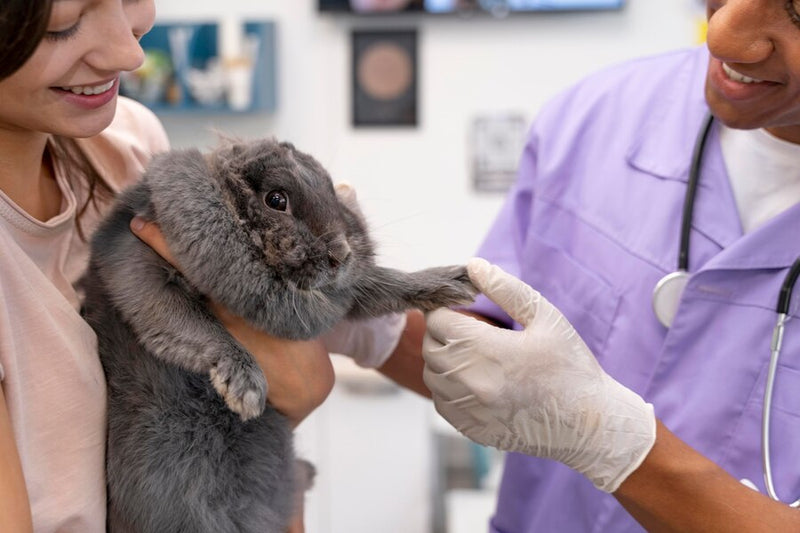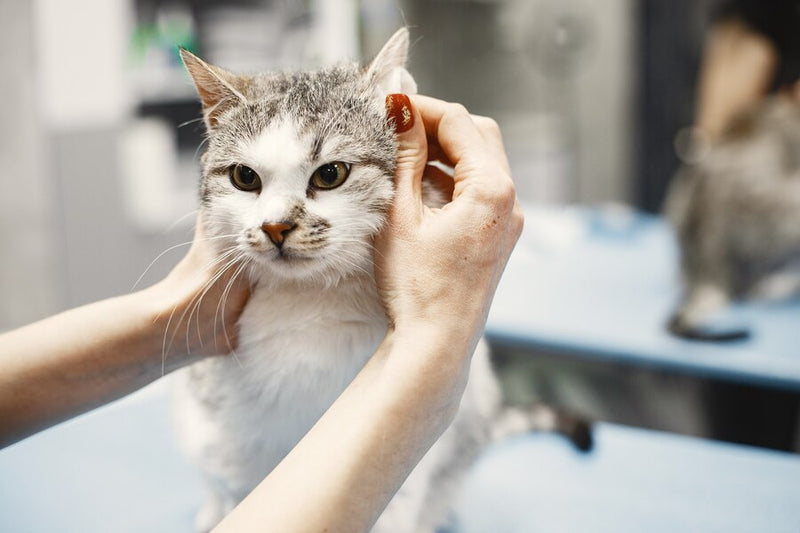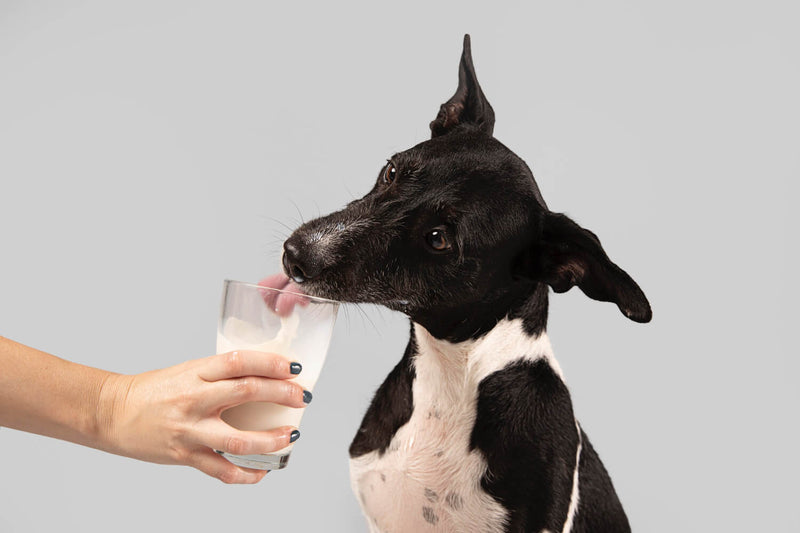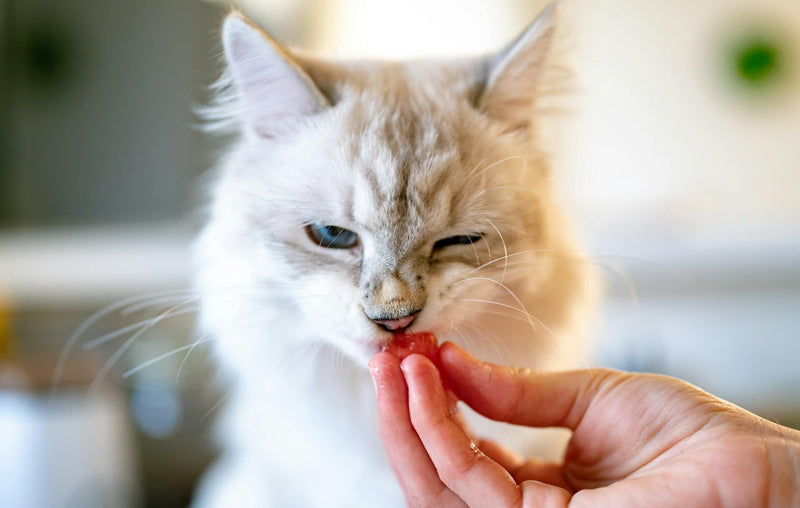
Welcome to Gritty Pet Co.
Your Canadian, specialty Pet Health & Wellness destination. 🇨🇦

Vet Reviewed & Approved
Dr. Ibrar A. is our veterinarian and a key member of our team. ✅
Kitten milk's proper nutrition is vital for the health and development of newborn kittens. Just like human babies, kittens require special care and attention to ensure they grow into healthy adult cats.
One of the essential aspects of kitten care is providing them with the right milk replacer to meet their nutritional needs. In this post, we'll explore the importance of kitten milk, feeding techniques, formula choices, and other essential tips to help you nurture your little feline friend.
Key Takeaways
Cow milk is a no-go for kittens. Felines lack the necessary enzymes to digest lactose, leading to potential dehydration and diarrhea if they consume it. Opt for a kitten milk replacer (KMR) specifically formulated to match their dietary needs.
Quality over convenience: When selecting a kitten milk replacer, look for products rich in essential nutrients like protein, fat, and vitamins. Replacers should also contain amino acids and probiotics to support overall health and digestion.
Weaning wisdom: Transitioning kittens from milk to solid food around 4-5 weeks is a delicate process. Begin with a slurry of kitten food and milk replacer, gradually reducing the milk. This period is messy but crucial for their development into healthy adults.
Kitten Milk Necessity
The use of commercial milk is essential for meeting the unique nutritional needs of kittens and promoting their optimal health. By providing kittens with a high-quality formula, caregivers can ensure their furry companions receive the essential nutrients they need for healthy growth and development, setting them up for a happy and fulfilling life. These products are carefully formulated to support healthy weight gain, muscle development, and overall growth in kittens during their early stages of life.
Unlike cow's milk, which lacks the balance of nutrients appropriate for kittens, commercial formulas are specifically designed to mimic a mother cat's milk, providing the ideal combination of proteins, fats, vitamins, and minerals to growing babies. Feeding cow's milk to kittens can lead to digestive issues and nutritional deficiencies, making it important to opt for a suitable milk replacer instead.

Feeding Newborns
Feeding newborn kittens requires special attention and care to ensure their health and well-being. Caregivers should learn proper bottle-feeding techniques, such as holding the kitten in a semi-upright position and allowing them to suckle naturally. It's important to feed kittens every 2-4 hours, as their tiny stomachs can only hold small amounts of milk at a time.
When it comes to choosing a formula, commercial options specifically formulated for kittens are the best choice. These formulas are designed to provide all the essential nutrients kittens need for healthy growth and development. Look for formulas labelled as kitten milk replacers, which are fortified with vitamins, minerals, and proteins to support their delicate systems.
Formula Choices
When it comes to formula choices, caregivers have various options to consider. Commercial kitten formulas are readily available and formulated to provide balanced nutrition. Evaluate the nutritional content of the formula, including protein, fat, carbohydrates, vitamins, and minerals. Choose formulas from reputable brands with a history of producing high-quality pet products. Read reviews and consult with veterinarians or other pet owners to determine the reputation of the formula.
In emergency situations where commercial formulas are not available, homemade formulas can be an option. Consult with a veterinarian before using a homemade formula to ensure it meets kittens' nutritional requirements.
Feeding Basics
Feeding newborn kittens requires attention to detail and proper technique to ensure their health and well-being. The following guidelines outline essential feeding basics for caring for these delicate creatures:
Maintain Proper Temperature : Warm the kitten formula to approximately 100°F (38°C) before feeding to replicate the warmth of their mother's milk.
Correct Bottle Posture : Hold the feeding bottle at a slight angle, allowing the formula to fill the nipple without forming air pockets.
Monitor Feeding Pace : Allow the kittens to suckle at their own pace, avoiding forceful feeding or tilting the bottle too high, which can lead to aspiration.
Feed Small Amounts Frequently : Newborn kittens have tiny stomachs and need to be fed small amounts every 2-3 hours, including during the night.
Observe Signs of Hunger : Watch for cues of hunger such as rooting, crying, or actively seeking the nipple, and feed accordingly to prevent dehydration or malnutrition.
Burping After Feeding : Gently pat the kitten's back to help release any trapped air bubbles and prevent discomfort or digestive issues.
Cleanliness is Key : Ensure feeding equipment is sterilized before each use, and discard any leftover formula to prevent contamination.
Advanced Nutrition
Ensuring kittens receive adequate nutrition is essential for their overall health and development. Kittens require essential nutrients like taurine, which is vital for their heart and eye health. Commercial kitten formulas are formulated to provide these nutrients in the right proportions, ensuring kittens grow into healthy adults.
Regular health monitoring is important to ensure kittens are thriving. Keep track of their weight gain, coat condition, and overall activity level. As kittens grow, they will gradually transition from milk to solid food. Start by offering moistened kitten kibble or canned food mixed with formula. Slowly decrease the formula content until kittens are fully weaned onto solid food by around 8 weeks of age.

Health & Behavior
Health and behavior are vital aspects of caring for newborn kittens. By tracking their growth and observing their behavior, caregivers can ensure their well-being and early detection of any health concerns. Here is how you can track kitten growth:
Weight Monitoring : Regularly weigh kittens using a kitchen scale or a pet scale to track their weight gain. Record their weight in a growth chart to monitor their progress.
Body Size and Development : Observe the kittens' physical appearance, including their size, body proportions, and fur condition. Document any noticeable changes over time.
Developmental Milestones : Keep track of developmental milestones such as opening eyes, starting to walk, and beginning to eat solid food. Note any delays or abnormalities in their development.
Here's a concise overview of how to recognize dehydration in kittens:
Skin Elasticity : Pinch the skin on the back of the kitten's neck. In well-hydrated kittens, the skin will quickly snap back into place. Dehydrated kittens will have slower skin elasticity, with the skin remaining tented or taking longer to return to its normal position.
Gum Moisture : Lift the kitten's lip and check the moisture level of the gums. Hydrated kittens will have moist and pink gums, while dehydrated kittens may have dry, sticky, or pale gums.
Capillary Refill Time : Press a finger against the kitten's gum to temporarily blanch it, then release. In well-hydrated kittens, the color should return to the gum within 1-2 seconds. Prolonged capillary refill time indicates dehydration.
Urine Output : Monitor the frequency and volume of urination. Reduced urine output or dark-colored urine may indicate dehydration.
Proper nutrition also plays a crucial role in fostering a strong bond between kittens and their caregivers. Providing nourishing meals not only supports their growth and development but also creates positive associations with feeding time. The act of feeding, cuddling, and caring for kittens helps build trust and affection, strengthening the bond between them and their human companions.
FAQ
1. Can I Feed My Kitten Regular Cow's Milk?
No, it's not recommended to feed kittens regular cow's milk. Cow's milk lacks essential nutrients that kittens need for proper growth and development. Additionally, it can cause digestive upset and nutritional deficiencies in young kittens.
2. How Do I Know If My Kitten Is Getting Enough Milk?
Monitor your kitten's weight gain and overall growth. A healthy kitten should steadily gain weight and appear active and alert. If you're concerned about your kitten's milk intake, consult your veterinarian for guidance.
3. How Often Should I Feed My Kitten Milk?
Newborn kittens should be fed kitten milk replacer every 2-3 hours, including overnight. As they grow older, the frequency of feedings can be gradually reduced, following their individual needs and appetite.
4. Should I Warm Kitten Milk Before Feeding?
Yes, it's essential to warm kitten milk replacer before feeding it to your kitten. Use a bottle warmer or place the bottle in warm water to gently heat the milk to body temperature. Avoid microwaving the milk, as it can create hot spots that may burn your kitten's mouth.
5. How Long Can I Store Prepared Kitten Milk Replacer?
Prepared kitten milk replacer should be refrigerated and used within 24 hours. Discard any unused portion after this time to prevent bacterial contamination. Always follow the manufacturer's instructions for storage and use of kitten milk replacer products.
Top 3 YouTube Videos on Kitten Milk
1. Kitten's First Sips:
Witness the heartwarming moments of a kitten drinking milk, highlighting the importance of proper nutrition from the start.
2. Bottle Feeding Basics:
A quick tutorial that introduces the process of bottle-feeding orphaned kittens, offering crucial tips to ensure they receive the nourishment they need.
3. DIY Kitten Milk Replacer:
Learn how to make homemade kitten milk replacer, ensuring your kitten has access to essential nutrients even in a pinch.
External Links for Further Reading
VCA Animal Hospitals - Raising Kittens: This resource provides an in-depth look at caring for newborn kittens, emphasizing the importance of warmth, frequent nursing, and monitoring for signs of health. Read More.
Final Thoughts
Providing proper nutrition, including the right milk replacer, is essential for the health and well-being of newborn kittens. By understanding their dietary needs and following feeding guidelines, caregivers can ensure that kittens grow into healthy and thriving adult cats.

















